Features | By Kasia Derkacz
An academic year like no other
The pandemic has taken a toll on everyone, including university students who found themselves navigating a very different academic year – whether at the start of their degrees with masks and social distancing forming a part of their first impression or towards the end where COVID-19 would become a lasting memory.
We all remember our university days, but students of 2020 will have more to reminisce about than trying to stay awake during lectures and pulling all-nighters to finish that dissertation. We asked three City students: Ricardo, Bahlla and Momodou about how they coped with an unprecedented year. For them and many other students at City, they relied on placement opportunities to take their learning to the next level and to acquire skills that will make them more employable in the competitive job market. This is where the City family can come into effect with alumni opening doors for current students at their place of work, helping them to get hired when they graduate.
Here are Riccardo, Bahlla and Momodou’s 2020 stories.
Riccardo
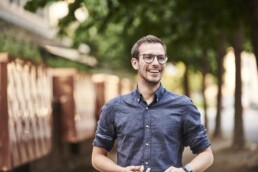
For Riccardo, not attending a formal graduation made his university journey feel incomplete. In fact, he did not feel like he was a graduate until after his first day of work. “I was done with my exams, I was free” he says “but not attending a ceremony where everyone is happy just did not make sense”. Still, Riccardo understands that he is one of the lucky ones for he landed a graduate role shortly after completing his degree. Although this was not straightforward because the role Riccardo initially secured ahead of graduation was cancelled due to a hiring freeze caused by the pandemic. “My plan was adapted a hundred times that year,” he says, reflecting on his experience of “sending more than 50 CVs and cover letters” to employers in his chosen sector.
Within a couple of months, Riccardo’s job seeking efforts paid off and he started his first graduate job as a structural engineer with a temporary work consultancy. Although this was not the direction he originally expected his career to take, Riccardo felt that the experience accelerated his skills and he was able to lead on a project creating an extension for Olympia London’s multi-storey car park. “I went from zero to one hundred. I was able to design something useful on my own, with almost no help from the anyone.”
With restrictions beginning to ease, the economy started to open and the job market saw signs of recovery. After six months in his first role, Riccardo was surprised to be contacted by the company he originally secured a role with, where he also completed his placement year. He says, “I was so excited and I was happy because being called by a company that remembers your work is nice.” After a short interview, Riccardo was offered the role and soon started his second job as a structural engineer. He says, “eventually it all went the way it was supposed to.”
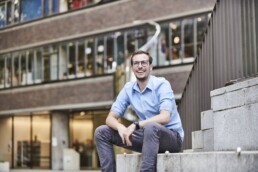
Working remotely during the pandemic presented some complications for Riccardo: “If you are in the office, there are other people you can talk to, there are more breaks.” The lack of proximity and new online methods of communication made Riccardo more aware of his working habits. He says, “especially because it was a new job, I needed to show that I am working but when I was doing a calculation or drawing something by hand and I did not touch the computer, MS Teams went offline.” Despite these frustrations, Riccardo feels that remote working has also been beneficial in “creating more spare time”, as not having to commute allowed him to go the gym, cook and see his friends more often. Riccardo hopes he will be able to benefit from a hybrid working model and balance the benefits of both office and home working.
Reflecting on the year that followed the completion of his degree, Riccardo says: “If you had asked me before what was going to happen, I would have never imagined my life going this way.”
Bahlla
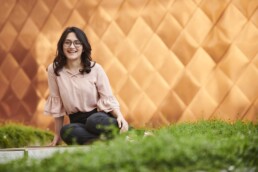
For Bahlla, a first-year Business Management student, remote working provided a new opportunity to intern with an international start-up as part of City’s Micro-Placement Programme. She says, “all the team members worked remotely in different countries – they did not have an official office.” Keen not to miss out on the office experience, Bahlla completed her placement from the Paddington WeWork co-working space, which she saw as an opportunity to learn new skills: “It was my own initiative. I had to order COVID-19 tests and take one every Sunday. This made me more organised and responsible for deadlines.” Working together with two of her friends, Bahlla also took advantage of the social aspects of her office, she says “we had a place where you could play ping pong and I learned how to do that. I have not played a sport for so long because of the pandemic, so it was really nice to learn some new skills and have fun.”
Despite the remote aspect of her placement, Bahlla felt there were many “opportunities for learning” that allowed her to “meet amazing people that I would not have met otherwise”. From the CEO based in India, who she had the chance to work with directly, to a journalist in Nigeria and a product manager from Dubai, Bahlla felt her network grew despite not having the chance to meet her work colleagues in person. She says, “it was just amazing to be in direct contact with these talented people.” However, working in a global team did not come without its challenges: “It was difficult at first”, she says, speaking about working across different times zones and poor connection affecting some team members based in more remote corners of the world. However, Bahlla was able to provide feedback about her experiences, which were taken on board by the CEO. “That was something I really enjoyed about working there – feedback was crucial” she says.
Can you offer one of our students a placement opportunity at your organisation?
The Micro-Placements Programme is a credit-bearing elective module and social mobility initiative offered to students to gain professional experience through short summer placements. Students experience real-life exposure to the business environment and enhance their employability skills, while adding value to the organisation of their placement.
The Micro-Placements Programme is a great way for alumni to get involved with outreach work and give back to the City community. Find out how you can support the programme on our website or by emailing micro-placements@city.ac.uk.
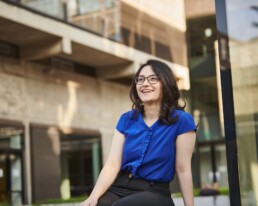
Across the five weeks of placement, Bahlla worked on multiple projects from reviewing the company’s website and producing videos for their future interns to conducting competitor research and market sizing. She says, “to get the full experience, I believe you must go above what you are expected to do.” With this ethos, Bahlla brought a lot of knowledge from her degree course to influence some of the projects: “I looked back at my marketing textbooks and they were very helpful. My employer found this very useful because they did not have some of this information before.” In fact, Bahlla’s audience segmentation, influenced by her module in marketing, will be used by the company to find future clients.
Reflecting on her experience, Bahlla says: “I saw it as a unique opportunity rather than a burden on me personally. An opportunity to learn some lessons that I would not have otherwise learned in a pandemic.” For Bahlla, being able to undertake her placement remotely provided her with some hope for the future: “It gives you hope and makes you proud as a person that even despite what is going on, you can still learn and work in such an environment.”
You can watch a video Bahlla created as part of her Micro-Placement and follow her student journey by visiting her website.
Momodou
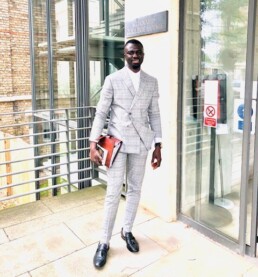
Studying a master’s degree in International Journalism during a pandemic “was not part of the plan” for Momodou. He says, “it was meant to be a hands-on course – we were supposed to be on the ground. But when the pandemic hit, we had to change everything.” Suddenly, not just his learning, but also the whole industry moved online: “We had to throw away everything and adapt. It was hard because we had to do everything online – the teaching, the production.”
Even his course materials were heavily impacted by the effects of Covid. “At the time, there was no other news except the pandemic,” he says. This was especially tricky as Momodou still had to produce news articles as part of his course and therefore required more creativity over the duration of the pandemic: “We had to find a new angle – something new, something different, something original.” Producing articles on how COVID-19 affected cycling, fundraising and home schooling for Momodou was all about working as a team: “It is amazing to see how things fit, when people are working on different parts and then you bring them all together.” Despite the challenging environment, Momodou felt the pandemic provided him with unique opportunities for learning. “I learned how to be patient and a good team player” he says.
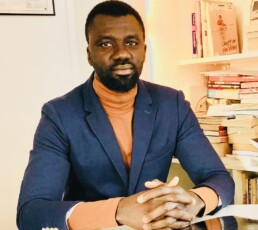
Reflecting on his university experience, Momodou believes that the rapid changes to learning during his master’s would have a lasting impact, even beyond graduation: “If I did my master’s degree from home, I can do anything from home,” he says. This adaptability was something Momodou feels helped him in his internship at the Daily Mirror, which he secured as part of the Widening Media Diversity Scholarship he received to study at City. He says, “those transferrable skills were something I carried with me when I went to the Daily Mirror. We came in without having to be trained and told what to do. We fit in well and adapted to the new working environment.” In fact, Momodou chose to see his experience as “a blessing in disguise, because we had a chance to be doing the same things the world of work was doing at the same time.”
However, being continually absorbed in news about the pandemic did not come without its difficulties: “I think the biggest challenge was being able to concentrate because you had news that was affecting your mood.” Momodou was not just experiencing the pandemic first-hand, he also had to write about it as part of his course and later his internship, meaning it was hard to get away from it: “It was always on your mind” he says. “The pandemic was the story of the year, but also the biggest story of our generation.”
Yet, being flexible and coming up with new ways of finding the news allowed Momodou to change his way of working. He says “when online your reach becomes wider. You do not only have to focus on the UK. It is also much easier to speak to people – during lockdown everyone was at home.”
Momodou now works as a Financial Journalist at Money Marketing Magazine. Since graduating from City, he is yet to meet his colleagues in person. “The newsroom is now in different houses,” he says. Although he feels excited for his first day of working on site, Momodou is cautious “Things we took for granted, like shaking hands will have you thinking twice” he says. However, Momodou is looking forward to working from the office part time and home part of the time. “Things have to change. They would not be the same – this new way of working is here to stay” he says.
Summarising his experience, Momodou believes that we have to be positive. He says “this is one of the things that the pandemic has taught us – to be hopeful”.
You can follow Momodou’s journey and read his articles by following him on Twitter @mmtouray or by visiting his online portfolio.